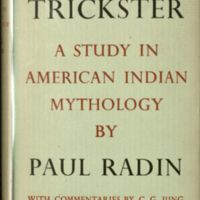The Trickster: a Study in American Indian Mythology
Dublin Core
Title
The Trickster: a Study in American Indian Mythology
Subject
Indian mythology
Tricksters in literature
Winnebago Indians
Winnebago Indians
Indian mythology -- North America
Tricksters in literature
North America
Tricksters in literature
Winnebago Indians
Winnebago Indians
Indian mythology -- North America
Tricksters in literature
North America
Description
The myth which forms the basis of Dr Radin's study is one of the most imaginative narratives known. It concerns the exploits of a grotesque individual whose main physical features are enormous digestive and sexual organs and who unites in himself some of the traits of a god, an animal, and a human being. Primarily his activities, over which has no conscious control, represent attempts to dupe others, yet actually always recoil upon himself. He is cruel, obscene and possessed of a voracious appetite which he is never permitted to satisfy. Creator and destroyer, affırmer and negator at one and the same time, his activities finally result in the transformation of himself into something approximating a human being. The figure of Trickster is of tremendous historical and psychological importance for an understanding of ourselves. As Dr. Jung suggests in his foreword, Trickster is the symbol of the unconscious and undifferentiated in man. That is why he is represented as being everything to everyman--god, animal, human being, hero, buffoon, he who antedates all values, good and evil.--From publisher description.
Creator
Paul Radin
Publisher
London, Routledge and Paul
Contributor
With commentaries by Karl Kerényi and C.G. Jung
Identifier
ISBN : 0837121124
ISBN : 9780837121123
ISBN : 9780837121123
Table Of Contents
The trickster myth of the Winnebago indians -- Supplementary trickster myths -- The nature and meaning of the myth / Paul Radin -- The trickster myth in relation to Greek mythology / Karl Kerenyi, translated by R.F.C. Hull -- On the psychology of the tickster figure / C.G. Jung, translated by R.F.C. Hull.
The trickster myth of the Winnebago Indians. The Winnebago trickster cycle -- Notes to page 3-35 -- Supplementary trickster myths. The Winnebago hare cycle -- Notes to page 63-91 -- Summary of the Assinibione trickster myth -- Summary of the Tlingit trickster myth -- The nature and meaning of the myth / by Paul Radin. The text -- Winnebago history and culture -- Winnebago mythology and literary tradition -- The Winnebago hare cycle and its cognates -- The Winnebago trickster figure -- The attitude of the Winnebago toward Wakdjunkaga -- The Wakjunkaga cycle as a satire -- The Wakdjunkaga cycle and its relation to other North American indian trickster cycles -- The trickster in relation to Greek mythology / by Karl Kerényi, translated by R.F.C. Hull. First impressions -- Style -- Parallels -- Nature of the trickster -- His difference from Hermes -- On the psychology of the trickster figure / by C.G. Jung, translated by R.F.C. Hull.
The trickster myth of the Winnebago Indians. The Winnebago trickster cycle -- Notes to page 3-35 -- Supplementary trickster myths. The Winnebago hare cycle -- Notes to page 63-91 -- Summary of the Assinibione trickster myth -- Summary of the Tlingit trickster myth -- The nature and meaning of the myth / by Paul Radin. The text -- Winnebago history and culture -- Winnebago mythology and literary tradition -- The Winnebago hare cycle and its cognates -- The Winnebago trickster figure -- The attitude of the Winnebago toward Wakdjunkaga -- The Wakjunkaga cycle as a satire -- The Wakdjunkaga cycle and its relation to other North American indian trickster cycles -- The trickster in relation to Greek mythology / by Karl Kerényi, translated by R.F.C. Hull. First impressions -- Style -- Parallels -- Nature of the trickster -- His difference from Hermes -- On the psychology of the trickster figure / by C.G. Jung, translated by R.F.C. Hull.
Text Item Type Metadata
Original Format
Book
Citation
Paul Radin, “The Trickster: a Study in American Indian Mythology,” Humanities Hub, accessed February 27, 2026, https://humanitieshub.sdsu.edu/omeka/items/show/786.

